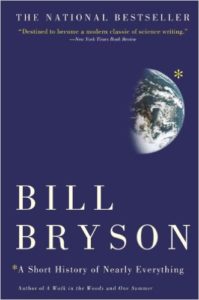 5/27 #MyFavoriteBooks Just what the title says it is: A Short History of Nearly Everything, by Bill Bryson.
5/27 #MyFavoriteBooks Just what the title says it is: A Short History of Nearly Everything, by Bill Bryson.
A couple of years ago I was cruising the North Atlantic aboard Holland America’s Veendam. I was alone, working every day on what turned out to be The Burglar who Counted the Spoons, and when I wasn’t working I was often reading a book from the ship’s impressive library. One such book was In a Sunburned Country, Bill Bryson’s report from Australia. I got through it in less time than A Short History of Nearly Everything because I was all by myself, and thus did not feel compelled to stop every few pages to read a couple of paragraphs aloud to my wife. The urge kept surfacing, however, and if there’d been a mouse in my cabin it might have heard more than it needed to know about the salt-water crocodile.
Bryson undertook to write A Short History of Nearly Everything because of his own extensive ignorance of matters scientific, an ignorance I shared in spades. He devoted a couple of years to educating himself about, well, nearly everything, and recounted it in so compellingly readable a fashion as to render it not only comprehensible to me—a miracle, that—but hugely fascinating in the bargain. I’ve returned to it from time to time over the years, dipping into it to refresh my memory of something or other, and I think I’m about ready to start at the beginning and re-read it straight through.
5/25 #MyFavoriteBooks Some magic for those of us who know books are real. The Museum of Literary Souls, by John Connolly.
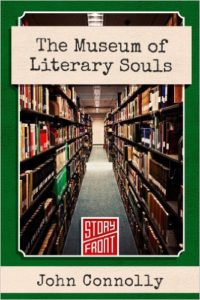 This one’s a treat, in a manner not unlike W. R. Kinsella’s Shoeless Joe. (Years ago, during the late Carol Brener’s reign at Murder Ink, she stocked and vigorously championed a handful of books that were not crime fiction by any stretch of the genre’s boundaries. They were books she liked, and books she was sure other mystery readers would like—and she was almost always right. Shoeless Joe was one such book. Come to think of it, I believe The Queen’s Gambit—see below—was another.)
This one’s a treat, in a manner not unlike W. R. Kinsella’s Shoeless Joe. (Years ago, during the late Carol Brener’s reign at Murder Ink, she stocked and vigorously championed a handful of books that were not crime fiction by any stretch of the genre’s boundaries. They were books she liked, and books she was sure other mystery readers would like—and she was almost always right. Shoeless Joe was one such book. Come to think of it, I believe The Queen’s Gambit—see below—was another.)
Connolly’s a mystery writer of considerable distinction, but this is not a mystery—and I know Carol would have loved it. As I suspect will most of y’all. One really wants that museum to exist, even as one wants to go there.
I should probably mention that The Museum of Literary Souls, a Kindle Single, is priced at $1.99, and may be borrowed free of charge by Kindle Unlimited subscribers.
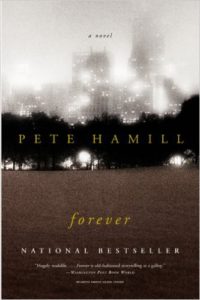 5/22—#MyFavoriteBooks Forever by Pete Hamill. Best New York novel ever. Brilliant premise beautifully realized. The author’s a national treasure, of course, but even more than that he’s a local treasure, and most of his books are love songs to the city. You’ll hum along with this one. Cormac O’Connor comes to New York from Ireland in 1740, and is given a remarkable gift: he’ll live forever, so long as he never sets foot outside the island of Manhattan. And as the decades slip by, and friends and lovers age and die, Cormac remains young and vigorous. (And, unlike that uncooperative cabdriver who left you stranded the other day, he’s got a perfect understandable reason for refusing to go to Brooklyn.)
5/22—#MyFavoriteBooks Forever by Pete Hamill. Best New York novel ever. Brilliant premise beautifully realized. The author’s a national treasure, of course, but even more than that he’s a local treasure, and most of his books are love songs to the city. You’ll hum along with this one. Cormac O’Connor comes to New York from Ireland in 1740, and is given a remarkable gift: he’ll live forever, so long as he never sets foot outside the island of Manhattan. And as the decades slip by, and friends and lovers age and die, Cormac remains young and vigorous. (And, unlike that uncooperative cabdriver who left you stranded the other day, he’s got a perfect understandable reason for refusing to go to Brooklyn.)
A wonderful read. You don’t have to be a New Yorker to love this book. You don’t have to be Irish or Jewish, either. But what could it hoit?
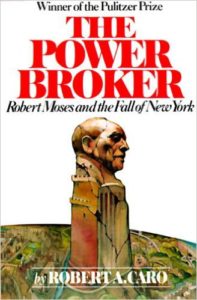 5/20—#MyFavoriteBooks The Power Broker by Robert A. Caro. http://amzn.to/20eUE0Z Best book I know about New York City in the 20th Century. Bob Caro, whose multi-volume work on LBJ may be the best book I know about *America* in the 20th Century, here examines the man who remade—and, while he was at it, did much to ruin—New York. Remarkable that this book, which continues to sell well, is not eVailable. It weighs a ton, and while reading it I wished I could have it instead on my Kindle. Sore wrists or no I was treated to exhaustive examinations of Jimmy Walker, Fiorello LaGuardia, FDR, Al Smith—indeed, to everyone who was part of the story. And I was sustained throughout by the comforting knowledge that Robert Moses, that thoroughgoing son of a bitch, would be safely dead and in the ground by the time the book was done. I don’t expect to reread The Power Broker, but by God it’s a keeper.
5/20—#MyFavoriteBooks The Power Broker by Robert A. Caro. http://amzn.to/20eUE0Z Best book I know about New York City in the 20th Century. Bob Caro, whose multi-volume work on LBJ may be the best book I know about *America* in the 20th Century, here examines the man who remade—and, while he was at it, did much to ruin—New York. Remarkable that this book, which continues to sell well, is not eVailable. It weighs a ton, and while reading it I wished I could have it instead on my Kindle. Sore wrists or no I was treated to exhaustive examinations of Jimmy Walker, Fiorello LaGuardia, FDR, Al Smith—indeed, to everyone who was part of the story. And I was sustained throughout by the comforting knowledge that Robert Moses, that thoroughgoing son of a bitch, would be safely dead and in the ground by the time the book was done. I don’t expect to reread The Power Broker, but by God it’s a keeper.
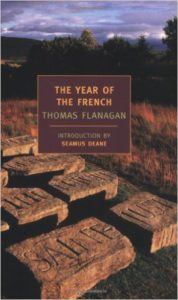 5/18—#MyFavoriteBooks The Year of the French, Thomas Flanagan’s novel of the 1798 Rising, vol. 1 of an epic trilogy.
5/18—#MyFavoriteBooks The Year of the French, Thomas Flanagan’s novel of the 1798 Rising, vol. 1 of an epic trilogy.
Tuesday, May 17. A couple of days ago I posted a tweet (or tweeted a post, whatever) with this hashtag. On the one hand, it seems presumptuous to, um, presume any of y’all will care what I like to read; OTOH, I get asked precisely that all the time, so why be coy?
Here are the Facebook versions of the tweets. The picks are the same, but on Facebook I’m not limited to 140 characters. I’ll add to this post—ideally every day, but who’s to say how long I’ll keep my nose to that particular grindstone? If you follow me on Twitter or Facebook, you’ll get the tweets and posts as they appear. If you miss them, I’ll add them here.
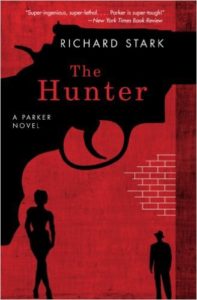 5/17—#MyFavoriteBooks The Parker novels by Richard Stark. http://amzn.to/27vtUim Start with The Hunter and read them all. University of Chicago Press has published the whole series in gorgeous paperback editions (thank you, Levi Stahl) and I was able to contribute introductions to three of them. Darwyn Cooke, who died way too young last week, turned several of the books into vibrant graphic novels—but read the books first and save the graphic novels for dessert. . . I’ve been a fan of these books since I read the first chapter of The Hunter before the second chapter was written—55+ years ago. I find the whole series endlessly rereadable, and Parker brilliantly realized and always compelling.
5/17—#MyFavoriteBooks The Parker novels by Richard Stark. http://amzn.to/27vtUim Start with The Hunter and read them all. University of Chicago Press has published the whole series in gorgeous paperback editions (thank you, Levi Stahl) and I was able to contribute introductions to three of them. Darwyn Cooke, who died way too young last week, turned several of the books into vibrant graphic novels—but read the books first and save the graphic novels for dessert. . . I’ve been a fan of these books since I read the first chapter of The Hunter before the second chapter was written—55+ years ago. I find the whole series endlessly rereadable, and Parker brilliantly realized and always compelling.
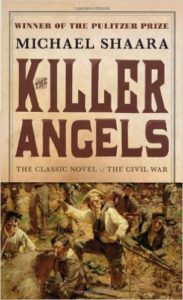 5/16—#MyFavoriteBooks The Killer Angels, Michael Shaara’s novel of Gettysburg. http://amzn.to/1TgKTeF Riveting and endlessly rereadable. It served as a model for his son Jeff, who’s gone on to chronicle the Civil War at length, and America’s other wars as well. All recommended, but I suggest you start with this one. Then try the two that bracket it, Jeff Shaara’s Gods and Generals and The Last Full Measure, in that order. And then just keep going. Jeff Shaara was a professional numismatist with no evident interest in writing until someone suggested he take up his father’s mantle, and it turned out to fit him like a glove. Who knew?
5/16—#MyFavoriteBooks The Killer Angels, Michael Shaara’s novel of Gettysburg. http://amzn.to/1TgKTeF Riveting and endlessly rereadable. It served as a model for his son Jeff, who’s gone on to chronicle the Civil War at length, and America’s other wars as well. All recommended, but I suggest you start with this one. Then try the two that bracket it, Jeff Shaara’s Gods and Generals and The Last Full Measure, in that order. And then just keep going. Jeff Shaara was a professional numismatist with no evident interest in writing until someone suggested he take up his father’s mantle, and it turned out to fit him like a glove. Who knew?
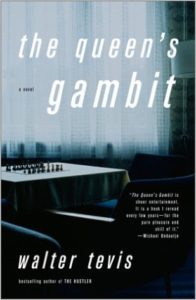 5/15—#MyFavoriteBooks The Queen’s Gambit by Walter Tevis. Richly satisfying—spellbinding, really—whether or not you understand the game of chess…Tevis was a wonderful writer. Small body of work, almost all of it very special. This one’s a particular favorite, and I’ve read it at least four times, always with delight.
5/15—#MyFavoriteBooks The Queen’s Gambit by Walter Tevis. Richly satisfying—spellbinding, really—whether or not you understand the game of chess…Tevis was a wonderful writer. Small body of work, almost all of it very special. This one’s a particular favorite, and I’ve read it at least four times, always with delight.
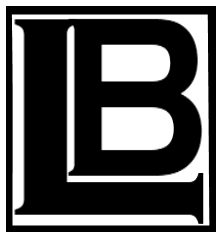
Heartily agree with you on Tevis’ Queen’s Gambit. It’s spectacular, but not widely known.
In fact, I like all of Tevis’ work. It’s a shame there isn’t more of it!
Yes, he left us too soon.
Derek H,
I grew up reading the Matthew Scudder, Travis McGee, Dave Robicheaux, and Dortmunder series and somehow completely missed Parker until a couple of years ago. I started with Butcher’s Moon and didn’t stop until I read the entire series. I am now starting the series again. I am continually amazed that something so seemingly simple and spare can be so riveting.
My brother has hooked me up with your blog/tweets/life in general, and I love the brief, personal descriptions.
Since I’m currently in training to be a NYC tour guide, I am working my way through a number of histories and guides to the city, but I’d been wary of the sheer toe-crushing thickness of The Power Broker…until now.
Well, as Dr. Johnson said of Paradise Lost, “None ever wished it longer.” But none of Caro’s words are wasted. (And it’s worth noting that Johnson greatly admired Milton’s masterpiece.)
Thanks for noting Pete Hamill’s book, Forever. I’ve been reading him since I was a child (some think I still am) when he wrote a column for Dorothy Schiff’s NY Post – the “good” Post. I would add Jimmy Breslin as another NYC treasure. He’s written for just about every newspaper in the city; sadly, he seems to be out of commission now.